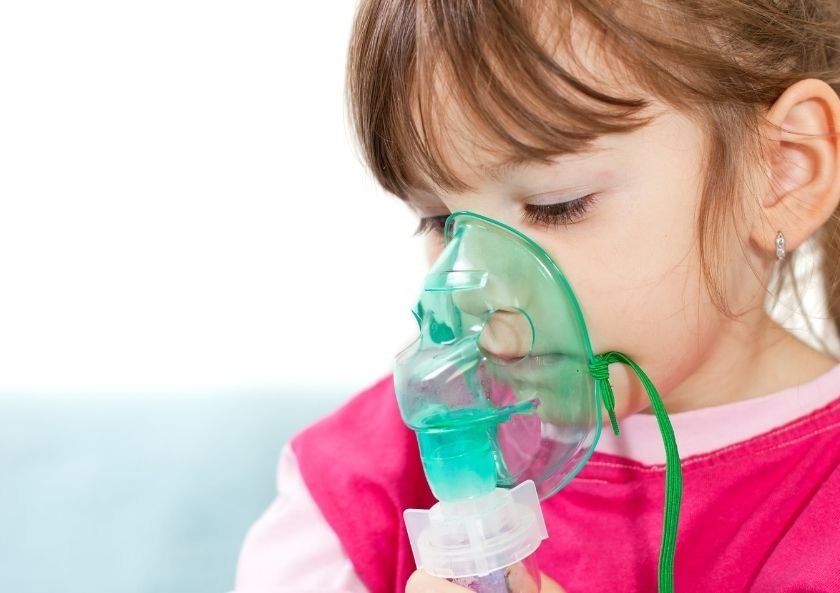Allergic asthma in children is a long-term disease of the lungs. It causes inflammation and narrowing of the airways and makes breathing difficult. Cough, wheezing, shortness of breath, and chest tightness are classic signs of asthma. Severe asthma can make it difficult to speak or be active. Some people call asthma “bronchial asthma”.
Allergic Asthma in Children
Allergic asthma is the most common form of asthma. Most allergic and non-allergic asthma symptoms are the same. However, allergic asthma is triggered by inhalation of allergens.
An allergen is typically a harmless substance such as dust mite, pet dandruff, pollen or mold. If you are allergic to a substance, this allergen triggers a response starting from the immune system. With a complex reaction, these allergens then cause inflammation and swelling of the passages in the airways of the lungs.This cough results in wheezing and other symptoms of asthma.
Asthma in Children
Most asthmatic children have asthma symptoms before they reach the age of five. Bronchial tubes – transitions that allow air to enter and exit the lungs – are small and narrow in infants, young children and preschool children. Cold, chest colds and other diseases can make these airways smaller by blocking them. In very young children, it can be difficult for parents and even doctors to understand that the symptoms are caused by asthma.
Symptoms of childhood asthma can range from a cough that lasts for days or weeks to sudden and frightening respiratory emergencies. Some common symptoms that parents should pay attention to are:
- Frequent cough, especially at night
- A rustling or whistling sound while breathing
- Difficulty in breathing, rapid breathing causing the skin around the neck or ribs to be pulled tight.
- Frequent cold settling in the chest
Asthma Crisis in Children
An asthma attack can be a terrible experience. Chest tightness and tightening of the lungs cause a challenging process.
As an asthmatic patient says, you feel like “drowning in the air”.
Asthma is inflammation and blockage of bronchial tubes, which are passages that allow air to enter and exit the lungs. During the asthma attack, the muscles surrounding the bronchial tubes contract, narrow the airways and make breathing very difficult. Other common symptoms are wheezing and a tightening sound on the chest.
The duration of the asthma attack can vary depending on what caused it and how long the respiratory tract has become inflamed. Light attacks can take only a few minutes; the more severe ones can take hours to days.
What Causes Asthma and Allergic Asthma in Children?
Allergens small enough to be inhaled deep into the lungs include:
- Pollen flying through the wind from trees, grass and weeds
- Mold spores and parts
- Animal dandruff (from skin or hair) and saliva
- Dust mite feces
- Cockroach feces
Asthma and Allergic Asthma Symptoms in Children
The most common asthma symptoms are:
- Coughing, especially at night, during exercise or laughing
- Difficulty breathing
- Tightness in the chest
- Shortness of breath
- Wheezing
How is Asthma Diagnosed in Children?
An allergist diagnoses by taking a comprehensive medical history and breath tests to measure the capacity of the lungs. This test diagnoses the severity of asthma and measures how well the treatment works.
A FeNO test or a exhaled nitric oxide test is a way to determine how much lung inflamed and how well inhaled steroids suppress this inflammation in patients with allergic or eosinophilic asthma. With allergic or eosinophilic asthma, you may sometimes feel breathing well, but when you measure the exhaled nitric oxide, this can still rise significantly and you can be better in the long run by using a small amount of inhaled steroids to suppress this inflammation.
How to Treat Allergic Asthma in Children?
Allergy specialists are specifically trained to help manage asthma and existing allergic conditions.
By taking a family history and testing through skin or blood tests, your allergy doctor can work with you to identify the allergens that trigger your asthma.
Your allergist can also help you make a plan to manage your condition. This plan may include quick relief and long-term asthma control medications, as well as tips to prevent triggers such as:
- Grass, tree and weed pollen
- Animal dandruff
- Dust mite
- Mold
Your allergist can also help you treat the underlying allergy that triggers your asthma. One treatment is allergy immunotherapy, a preventive treatment that helps your body be less sensitive to certain allergens.This can be achieved with two drugs: allergy vaccines and sublingual tablets that dissolve under the tongue.
What should asthmatic patients pay attention to?
It should be remembered that allergens are not the only thing that can worsen allergic asthma. Irritants can still trigger an asthma attack, even if they do not cause an allergic reaction. These include:
- Tobacco, fireplace, candles, incense or firework smoke
- Air pollution
- Cold weather
- Exercise in cold weather
- Strong chemical smells or fumes
- Perfumes, air fresheners or other fragrant products
- Dusty rooms



